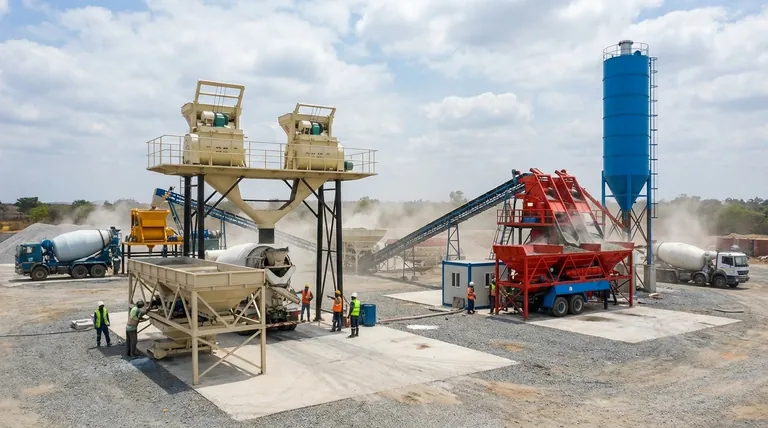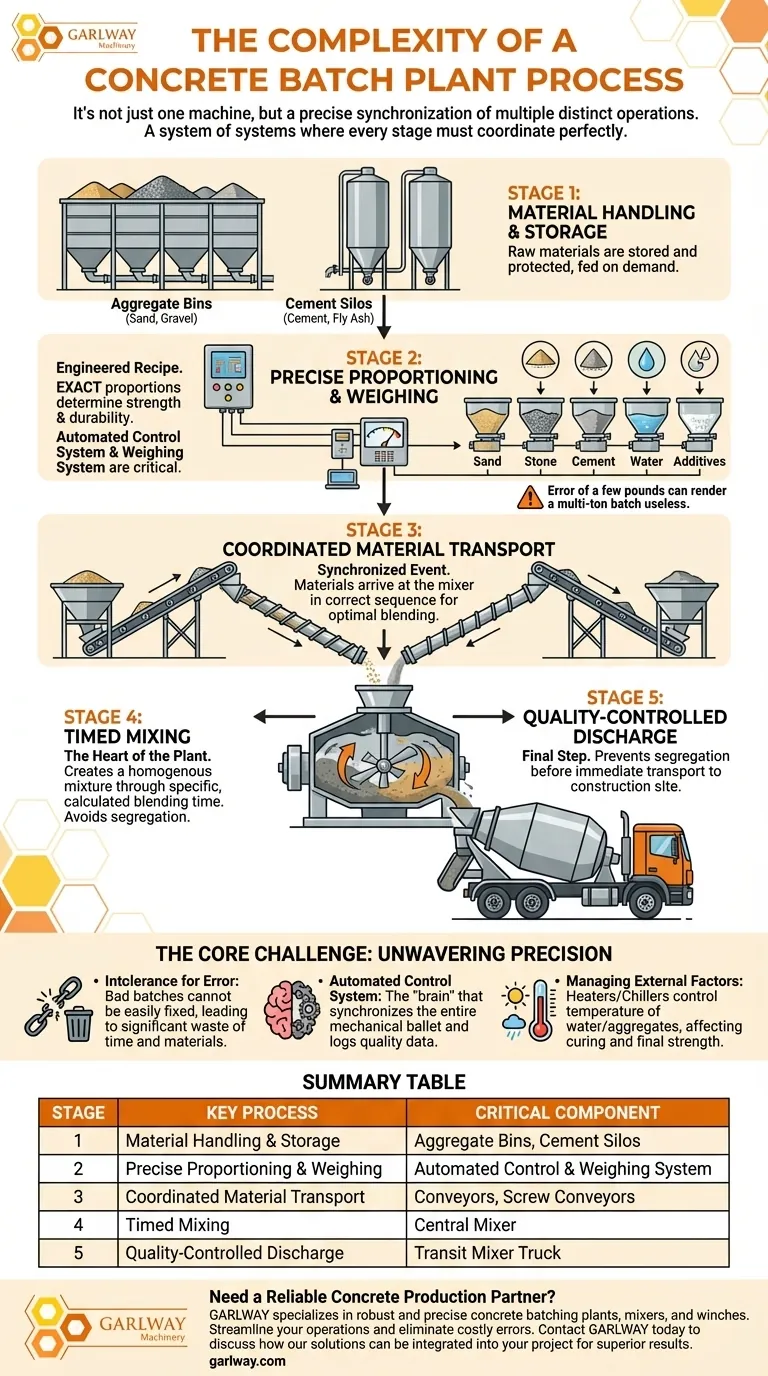The complexity of a concrete batch plant process stems from its need to precisely synchronize multiple distinct operations—from proportioning and weighing raw materials to mixing and discharge. It functions less like a single machine and more like an integrated factory where a failure in any one stage compromises the integrity of the final product.
A concrete batch plant is a system of systems. Its complexity arises not from any single task, but from the requirement that every component and every stage—storage, measurement, transport, and mixing—must operate in perfect, automated coordination to produce concrete that meets exact engineering specifications.

Deconstructing the Process: From Raw Material to Final Product
To understand the complexity, we must break down the operational flow. Each stage is a critical link in a chain that cannot be broken.
Stage 1: Material Handling and Storage
The process begins with the storage of raw materials. This involves separate, large-scale containment for aggregates (sand, gravel), cementitious materials (cement, fly ash), and chemical additives.
These materials are stored in aggregate bins and cement silos, which must protect them from the elements and feed them into the system on demand.
Stage 2: Precise Proportioning and Weighing
This is the most critical source of complexity. Concrete is not just a mixture; it's an engineered recipe where exact proportions determine its strength, durability, and workability.
The automated control system directs the electrical weighing system to measure each ingredient—sand, stone, cement, water, and additives—to precise specifications using dedicated weigh hoppers. An error of a few pounds in a multi-ton batch can render it useless.
Stage 3: Coordinated Material Transport
Once weighed, the materials must be transported to the central mixer. This is a synchronized event.
Conveyors move the aggregates from the bins, while screw conveyors typically transport cement from the silos. All materials must arrive at the mixer in the correct sequence for optimal blending.
Stage 4: Timed Mixing
The mixer is the heart of the plant. It receives all the proportioned ingredients and must blend them thoroughly for a specific, calculated amount of time.
This stage is not just about combining materials; it's about creating a homogenous mixture. Insufficient mixing leads to weak spots, while over-mixing can negatively affect the concrete's properties.
Stage 5: Quality-Controlled Discharge
After the mixing cycle is complete, the fresh concrete is discharged. This final step must be managed to prevent segregation of the materials.
The concrete is loaded directly into a transit mixer truck or concrete pump for immediate transport to the construction site, completing the plant's role in the supply chain.
Understanding the Core Challenge: Unwavering Precision
The complexity of the batch plant process isn't for its own sake; it is a direct response to the non-negotiable demands of modern construction. A failure at any point has significant consequences.
The Intolerance for Error
Unlike other manufacturing processes, a bad batch of concrete cannot be easily fixed or re-worked. It must be discarded, wasting significant time, money, and materials. The entire system is therefore built around redundancy and precision to eliminate error.
The Role of the Control System
The "brain" of the operation is the control system. This automated unit synchronizes the conveyors, opens and closes gates on the hoppers, runs the mixer for the correct duration, and logs data for quality control. The entire mechanical ballet is conducted by this single point of control.
The Impact of External Factors
Complexity is further increased by the need to manage environmental variables. Some plants include heaters or chillers to control the temperature of the water or aggregates, as concrete temperature is a critical factor in its curing process and final strength.
Applying This to Your Goal
Understanding this process allows you to focus on the elements most critical to your objectives.
- If your primary focus is operational efficiency: The key is the reliability and calibration of the automated control and weighing systems, as these dictate speed and accuracy.
- If your primary focus is quality control: The key is the precision of the proportioning stage and the consistency of the timed mixing cycle.
- If your primary focus is project management: The key is understanding that the plant is a just-in-time manufacturing hub that requires seamless coordination between raw material supply and site delivery demands.
Ultimately, the complexity of a concrete batch plant is a direct reflection of the precision required to create the foundational material of our modern infrastructure.
Summary Table:
| Stage | Key Process | Critical Component |
|---|---|---|
| 1 | Material Handling & Storage | Aggregate Bins, Cement Silos |
| 2 | Precise Proportioning & Weighing | Automated Control & Weighing System |
| 3 | Coordinated Material Transport | Conveyors, Screw Conveyors |
| 4 | Timed Mixing | Central Mixer |
| 5 | Quality-Controlled Discharge | Transit Mixer Truck |
Need a Reliable Concrete Production Partner?
Understanding this complexity is the first step. Let GARLWAY, a specialist in construction machinery, handle the rest. We provide robust and precise concrete batching plants, mixers, and winches designed for construction companies and contractors who demand efficiency and quality.
We help you streamline your operations and eliminate costly errors. Contact GARLWAY today to discuss how our solutions can be integrated into your project for superior results.
Visual Guide

Related Products
- HZS35 Small Cement Concrete Mixing Batch Plant
- Construction Products Concrete Plant Machine Mixing Concrete Mixer
- Portable Concrete Mixer Machine Equipment for Mixing Concrete
- HZS75 Concrete Batching Plant Cement Mixer Price Concrete Mixer Bunnings Mixing Plant
- HZS180 Ready Mix Concrete Plant for Foundations with Sand and Cement
People Also Ask
- What are the key features of a commercial concrete mixing plant? Boost Efficiency & Quality Control
- Why is accurate material batching important in concrete mixing? Ensure Structural Integrity and Durability
- How does the concrete mixing process work in a batching plant? Achieve Precision & Efficiency
- What are the advantages of ready mix concrete? Higher Quality, Efficiency & Cost Savings
- What precautions should be taken when using the network port on concrete mixing station equipment? Essential Safety Steps to Prevent Damage
- What are the main causes of shaft end leakage in mixing stations? Prevent Costly Downtime & Repairs
- Is RMC good for construction? Boost Quality, Speed & Efficiency on Your Project
- How does the aggregate weighing conveyor work in a concrete batching plant? A Guide to Precise Batching















